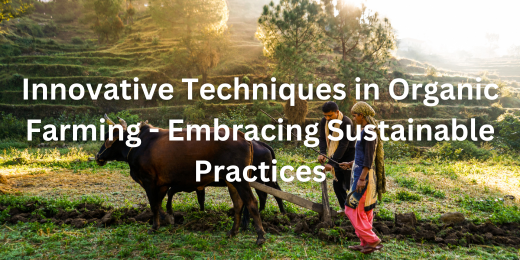
Innovative Techniques in Organic Farming – Embracing Sustainable Practices
Innovative techniques in organic farming
Introduction to Organic Farming in South India
Organic farming has a rich history in South Indian agriculture, deeply connected to traditional cultivation practices. Farmers have long valued natural methods for growing crops, ensuring the balance of ecosystems. Today, this legacy is evolving with innovative techniques in organic farming, combining tradition with modern advancements for better productivity and sustainability.
A significant shift is visible as more farmers adopt organic methods, understanding the benefits for health and the environment. These methods reduce dependence on harmful chemicals while improving soil fertility. Through sustainable farming practices, farmers are addressing environmental challenges, ensuring future generations inherit fertile land and a cleaner environment.
State governments are actively supporting organic farming through subsidies, workshops, and training programmes for farmers. These efforts help raise awareness and encourage a wider adoption of organic agriculture. By embracing these advancements, South Indian farming communities are setting an inspiring example for sustainable agricultural development.
Technological Innovations Enhancing Organic Farming
Technology is transforming organic farming by introducing tools that optimise efficiency and sustainability. Precision agriculture uses sensors and data analysis to monitor soil health and crop needs. These innovative techniques in organic farming ensure resources are used effectively, improving yields while reducing waste, aligning with eco-friendly farming goals.
Remote sensing technologies, including satellite imagery and drones, provide valuable insights for better farm management. These tools help farmers assess crop health, detect pest infestations, and monitor irrigation requirements. Such advancements integrate seamlessly with sustainable farming practices, making organic farming more productive and environmentally conscious.
Mobile applications empower farmers with real-time updates on weather, pest control strategies, and market trends. These user-friendly tools support informed decision-making and foster smarter agricultural practices. By embracing these technologies, farmers can balance tradition with innovation, ensuring organic farming continues to thrive and benefit both people and the planet.
Climate-Resilient Farming Practices
Climate-resilient farming practices are essential to address the challenges posed by changing weather patterns. Drought-resistant crop varieties help maintain productivity even during dry spells. These innovative techniques in organic farming are crucial in ensuring food security while reducing dependency on external water sources and enhancing farm resilience.
Water conservation techniques play a vital role in sustainable farming. Methods such as rainwater harvesting and drip irrigation reduce water wastage while ensuring efficient irrigation. These strategies align with sustainable farming practices, promoting responsible resource usage and safeguarding water supplies for future generations.
The management of soil health is essential to the success of agriculture over the long term. Organic amendments and crop rotation practices enhance soil fertility and prevent degradation. By maintaining healthy soil, farmers can improve yields and reduce the need for chemical inputs, ensuring the sustainability of the land for future farming generations.
Community-Led Organic Farming Initiatives
Community-led organic farming initiatives play a crucial role in promoting sustainable agriculture. Farmer cooperatives enable collaboration between farmers, allowing them to share resources and knowledge. These initiatives strengthen community ties and help farmers access larger markets, making it easier to implement innovative techniques in organic farming.
Attending educational programs is absolutely necessary in order to enable farmers to embrace organic farming practices. These sessions teach sustainable farming methods, improving crop yields and reducing environmental impact. By learning new skills, farmers can embrace sustainable farming practices that not only benefit their crops but also protect the land for future generations.
Local market development further supports the growth of organic farming. By establishing markets that focus on organic produce, consumers can access healthier food options. This provides farmers with fair prices while encouraging the adoption of organic farming methods across the community.
Case Studies of Successful Organic Farms in South India
Uyir Organic Farmers Market in Tamil Nadu is a prime example of innovative techniques in organic farming. It offers a platform for farmers to sell their produce directly to consumers. This market not only supports local farmers but also promotes sustainable farming practices by prioritising organic products free from harmful chemicals.
Viswamatha Farms in Andhra Pradesh combines traditional organic farming with modern satellite technology. By integrating these methods, they enhance both productivity and sustainability. Their model demonstrates how sustainable farming practices can improve crop yields and reduce environmental impact.
The Annapurna Rice Library in Assam is committed to preserving indigenous rice varieties. By promoting biodiversity, they support organic farming practices that enhance soil health. This initiative highlights the importance of maintaining agricultural diversity while embracing organic techniques for a more sustainable future.
Future Prospects and Challenges in Organic Farming
There have been new options made available to farmers as a result of the increased demand for organic products. As consumer awareness increases, farmers are adopting innovative techniques in organic farming to meet market expectations. This shift is encouraging the expansion of organic farming and providing new avenues for sustainable growth in the agricultural sector.
Policy support and subsidies play a crucial role in sustaining organic farming growth. Governments must continue to back organic agriculture through favourable policies and financial incentives. These initiatives help farmers transition to sustainable farming practices and ensure that organic farming remains a viable and prosperous option for future generations.
Despite the positive outlook, challenges remain. High labour costs and complex certification processes pose barriers to wider adoption. Addressing these issues will be key to overcoming obstacles and ensuring that organic farming reaches its full potential in the years to come.
To purchase a premium selection of organic food products and eco-friendly fertilizers, visit the nearest Uyir Organic Farmers Market or explore online at www.uyironline.in or www.uyirorganic.farm.